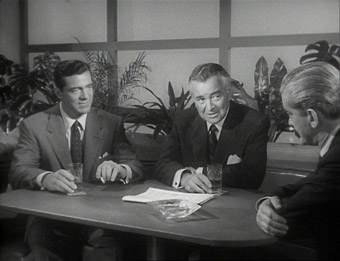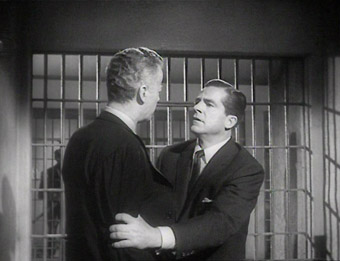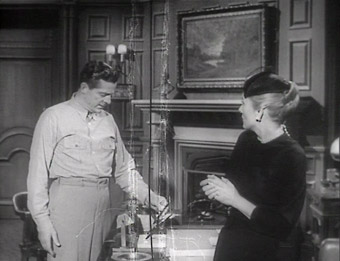|
At the heart of the neatly titled Beyond a Reasonable Doubt, Fritz Lang's final American film before returning to Germany, lies an important and still very relevant question: when you operate a system of capital punishment, how can you guarantee, beyond all question, that the person you are executing is guilty of the crime for which they have been convicted? It's something that even supporters of the death penalty have no satisfactory answer for, beyond the frankly unacceptable "mistakes will occasionally happen." For families of the wrongfully executed man or woman, like those of the victim of the original crime, that's not going to cut it.
If you're old enough, you'll may well remember the names Hugh Callaghan, Patrick Joseph Hill, Gerard Hunter, Richard McIlkenny, William Power and John Walker, aka The Birmingham Six, who were convicted of planting bombs in Birmingham pubs, crimes that caused the deaths of 21 people and injuries to 182 others. And then there were Paul Michael Hill, Gerry Conlon, Paddy Armstrong and Carole Richardson, who were convicted of two pub bombings in Guildford that killed ten people and left another 65 injured. And what about Jim Robinson and Michael and Vincent Hickey, who were sentenced to life imprisonment for the murder of 13-year-old paperboy Carl Bridgewater. Before the abolition of capital punishment, all of the above would probably have been executed for their crimes, but all have since been pardoned and freed. Not all were so lucky. In January 1953, Derek Bentley was hanged for killing of a policeman, a crime that was actually committed by his under-aged companion Christopher Craig. After half a century of campaigning, Bentley was eventually pardoned in July 1998. And on the 5th March 1950, Timothy John Evans was executed for the murder of his wife and young daughter, a crime that was later attributed to serial killer John Reginald Halliday Christie, in whose house Evans and his family were lodging. And that's just a sampling from UK criminal history. If you want to dig further you could start with the list of one hundred and thirty-eight American Death Row prisoners whose convictions have been overturned since 1971. And these are the appeals that were actually successful.

Sharing this concern about the potentially lethal uncertainty of the American justice system is newspaper editor and anti-death penalty campaigner Austin Spencer (Sidney Blackmer), who is trying to convince former journalist turned successful novel writer Tom Garrett (Dana Andrews) – who is engaged to Austin's daughter Susan (Joan Fontaine) – that this is a subject worthy of more than a sustained newspaper campaign. Although not completely convinced, Tom is being hounded by his publisher for a second novel that has so far fallen victim to writer's block. And Austin has an idea, one that will both help his anti-capital punishment cause and give Tom the material for a sensational best-seller: they frame Tom for a murder using only circumstantial evidence, and if he is convicted then Austin will step forward to prove the whole thing was set up by them from the start. To avoid the risk that she might give the away the game with things get tough, they decide not to tell Susan what they are up to. Now what could possibly go wrong with that?
It's a fascinating setup and is intriguingly developed, as the two set about planting the incriminating evidence and Tom ingratiates himself with the murdered girl's night club dancer colleague Dolly, dropping just enough hints to make her wonder just who he might really be. It's when Tom gets banged up and his safety net is disabled by the first of the film's two rug-pulling twists that the film starts to unexpectedly loosen its grip. Given the tension-wringing potential of Tom's predicament, it's a little surprising that Lang sidelines him somewhat to focus instead on Susan's search for the evidence that will clear his name and the efforts of district attorney Roy Thompson (Philip Bourneuf) to confirm his guilt. Lending a hand to both is Thompson's lackey Bob Hale (Arthur Franz), who has a thing for Susan and is clearly mixed emotions about helping her find proof of Tom's innocence.

I remember seeing this film in my youth and being gripped by the story and sideswiped by the twists, the second of which provides the film with an challenging kick-off point for a debate on the ethics of capital punishment, but which would be grossly unfair to reveal here.* Coming back to the film a good few years later and aware of the plot twists, I was still gripped by the story but less so by how that second half plays out. Spencer, Garrett and Dolly aside, the characters are a dry and largely uninteresting bunch, and coupled with Douglas Morrow's utilitarian script and Lang's preference for wide and mid shots over emotive close-ups, this can't help but put the audience at a bit of a distance, when we should be sweating it out with the increasingly terrified Tom. Nonetheless, Beyond a Reasonable Doubt is still a cleverly devised and involving drama that works best on a first viewing when the twists really do catch you out, and it has to be one of the first American studio films to level-headedly question the morality of state sanctioned execution, and suggest that it really could be possible to mistakenly send an innocent man to his death.
Early in the days of DVD, there was a general acceptance that older films were not going to look as good as more recent ones. The prints used for transfer had often been poorly cared for and were in less than sparkling shape, and restoring these films to anything even approaching pristine condition cost time and money. Over time that perception began to change. Studios and independent labels alike began looking for better quality source prints and cleaning them up or making transfers from the original negatives, and the software used for digital restoration and enhancement also improved and became more widely used. Specialist restoration firms began working wonders with even the oldest film material – witness in particular the astonishing restorations on the Masters of Cinema releases of City Girl, M or Metropolis, or what a small label like Shameless is achieving with even the most obscure horror films from the 70s and 80s. Of course, not every distributor has access to material of this quality, but such restorations have raised the bar, to the degree that we now come to DVD releases of older films with certain expectations regarding print cleanliness, detail and picture stability, and most of the time these expectations tend to be met. Most of the time.

On the plus side the contrast here is generally well balanced and the detail in the better material is rather good. Unfortunately that's where the good news ends. It's been a while since I saw a transfer as peppered with dust as Exposure's DVD of Beyond a Reasonable Doubt. The amount that is visible at any one time does vary considerably, but at its worst is a small dance of dust and dirt, and is occasionally joined by the odd missing frame and some brief but occasionally spectacular print damage and repair. Adding to the problem is what appears to be an NTSC to PAL conversion from a video source, which in some scenes (though not all, suggesting this source was a composite from two different originals) results in some jagged edges on diagonals and the loss of fine detail to sometimes visible scan lines, something particularly evident in wider shots.
Like Lang's previous film, While the City Sleeps, Beyond a Reasonable Doubt was shot in the 1.37:1 Academy ratio with the knowledge that it was probably going to be cropped for theatrical distribution, hence the large amount of space left above the heads of the characters. The film was cropped to 2.0:1 and presented in SuperScope (or as the trailer has it, RKO Scope) in some European markets, and while the scope framing would trim the headroom to a more comfortable level, there is otherwise no sense that the 1.30:1 transfer here is otherwise mis-framed.
Despite the odd pop and crackle and the inevitable range restrictions, the mono Dolby 2.0 soundtrack is otherwise in rather good shape, with the dialogue clear and the music free of serious distortion.
Trailer (2:40)
A scope framed trailer that should help you to compare the shooting ratio with the crop for European distribution, one that gives away one of the plot twists, so is not recommended pre-feature viewing.
Stills Gallery
A nicely presented gallery of 44 posters, production still and press release photos from the film. Two of the posters are also included as an insert in the DVD case.
A solidly structured, workmanlike film built around a strong central concept that plays best on a first viewing when you don't know the twists. Exposure's DVD is light on extras, but is really let down by the condition of the source print(s) and issues caused by the standards conversion. It could well be that this is the only version currently available – if this is the case Exposure would do well to promote that. We film fans are, after all, a forgiving lot when explanations are forthcoming.
|